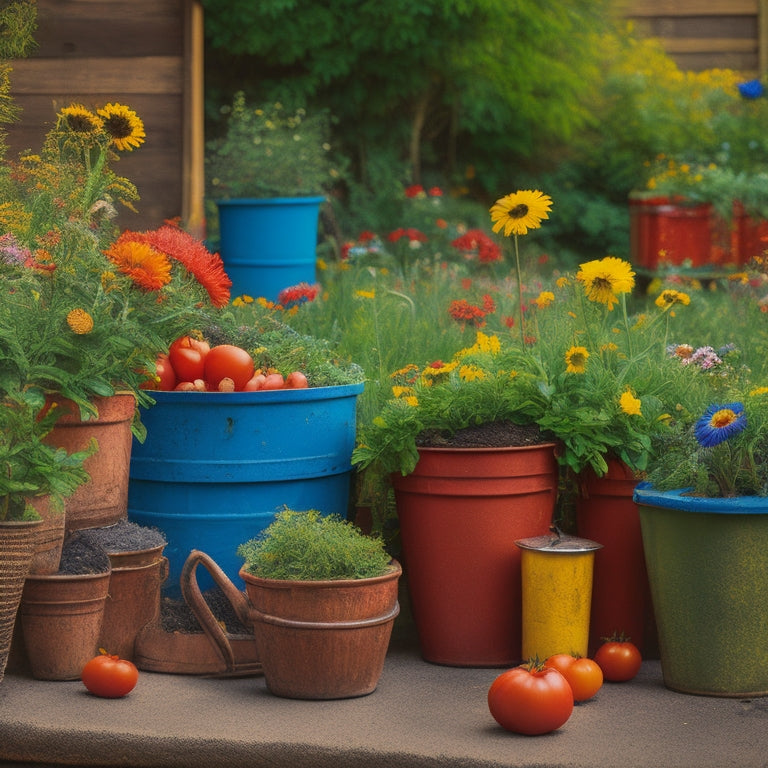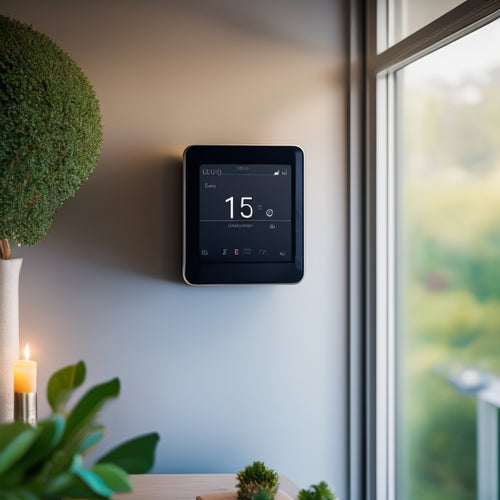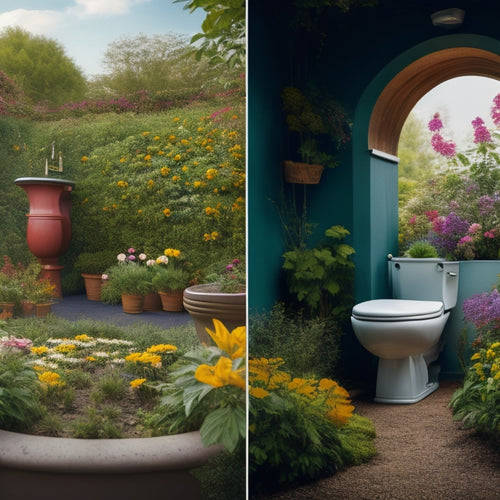
Why Transform Your Home Waste Into Garden Gold?
Share
Transforming your home waste into garden gold is a revolutionary shift for your garden and the environment! By composting, you'll reduce waste sent to landfills, minimizing greenhouse gas emissions and toxic leachate production. You'll create precious, nutrient-rich soil that'll make your plants thrive, conserve water, and save money on fertilizers. Plus, you'll support biodiversity and produce healthier crops naturally. With composting, you'll close the nutrient cycle, turning trash into treasure easily. And that's just the beginning – uncover the full potential of composting and open a world of sustainable gardening practices that'll take your garden to the next level!
Key Takeaways
- Composting reduces waste sent to landfills, minimizing greenhouse gas emissions and environmental impact while creating a valuable nutrient-rich soil amendment.
- Transforming home waste into compost saves money on fertilizers, reduces reliance on synthetic chemicals, and promotes ecological balance in gardening.
- Compost enhances soil structure, conserves water resources, and supports healthy plant growth, resulting in thriving plants and reduced watering bills.
- Composting techniques support biodiversity in ecosystems, creating habitats for beneficial insects and encouraging soil biodiversity and ecosystem balance.
- By composting, you can turn household waste into a natural, sustainable, and cost-effective gardening resource, promoting a self-sustaining garden ecosystem.
Reduce Waste Sent to Landfills
By reducing the amount of waste sent to landfills, you're not only conserving precious landfill space but also decreasing the environmental impact of your daily activities. This vital step in waste management has numerous benefits, including reducing greenhouse gas emissions and minimizing the production of toxic leachate.
Furthermore, adopting clean energy solutions, such as solar power integration, can further improve sustainability efforts. Additionally, the development of charging infrastructure is essential for promoting a greener future.
By composting, you're diverting organic waste from landfills, where it would otherwise decompose anaerobically, producing methane - a potent greenhouse gas. Instead, you're utilizing the compost benefits, converting waste into an important resource that can enhance your soil.
Create Valuable Nutrient-Rich Soil
You're now holding the key to revealing a wealth of nutrients for your garden - rich, dark compost that's teeming with life.
By perfecting composting techniques, you'll uncover the secret to creating beneficial nutrient-rich soil. This isn't just a matter of piling up kitchen scraps and leaves; it's an art that requires the right balance of "green" and "brown" materials, regular turning, and patience.
Additionally, incorporating renewable energy sources, such as solar energy, can further reduce your carbon footprint and enhance your garden's sustainability.
The payoff is worth it: your compost will become a potent soil amendment, enhancing your garden's fertility and structure.
As you refine your composting skills, you'll be amazed at how your plants thrive in this nutrient-dense soil, and you'll enjoy the freedom of growing your own food without relying on synthetic fertilizers.
Lower Your Watering Bills
By utilizing the power of compost, you're not only enhancing your soil but also conserving precious water resources.
Much like commercial fleets shifting to solar-powered EV charging reducing carbon footprint, you'll reduce evaporation rates now, as the organic matter acts as a sponge, holding moisture for your plants to absorb.
Conserving Precious Water Resources
Water-efficient gardening practices are a wealth of benefits for your wallet and the environment, as they slash your watering bills and conserve precious water resources. By adopting sustainable gardening methods, you'll be doing your part in water conservation.
One effective way is to use compost, which acts as a natural sponge, retaining water and reducing the need for frequent watering. Additionally, mulching helps to prevent moisture loss, allowing your plants to thrive with minimal watering.
Furthermore, incorporating energy harvesting systems renewable energy solutions can further reduce your carbon footprint and operating costs. By leveraging government incentives, you can offset the costs of investing in renewable energy for your garden.
Reduce Evaporation Rates Now
Around the world, evaporation is silently siphoning precious water from gardens, leaving plants parched and owners perplexed. You can break this cycle by employing evaporation techniques that optimize moisture retention in your soil.
One effective method is to apply a 2-3 inch layer of organic mulch, which greatly reduces evaporation rates. Furthermore, incorporating compost into your soil structure enhances its water-holding capacity, allowing your plants to thrive on less water.
In addition, using renewable energy sources for EV charging, such as solar-powered fast charging, can also contribute to a sustainable future.
Optimize Soil Moisture Levels
With every drop of water precious, optimizing soil moisture levels is essential for a thriving garden.
You'll want to release the full potential of your soil by improving its retention capabilities. By adding organic matter like compost, you'll enhance soil structure, allowing it to hold more water and reduce runoff.
This moisture regulation technique guarantees your plants receive the right amount of water, exactly when they need it. As a result, you'll lower your watering bills and enjoy a more resilient, drought-tolerant garden.
Produce Healthier Crops Naturally
How can you coax maximum nutrition from your crops without relying on synthetic fertilizers? By adopting a comprehensive approach to gardening, you can create a thriving ecosystem that produces healthier crops naturally.
Crop rotation is key to maintaining soil fertility and structure, while also reducing pest and disease pressure. Implement organic pest control methods, such as introducing beneficial insects or using neem oil, to keep pests at bay.
This approach not only promotes healthier crops but also supports a balanced ecosystem. By working with nature, you'll be rewarded with strong, nutrient-dense crops that taste incredible and are free from harsh chemicals.
Support Biodiversity in Ecosystems
What role do you play in preserving the delicate balance of your garden's ecosystem? By converting your home waste into garden gold, you're creating a haven for biodiversity.
You're supporting ecosystem balance by providing habitat creation for beneficial insects and wildlife attraction. Native plants thrive in your garden, thanks to the organic matter rich soil, which encourages soil biodiversity.
This, in turn, supports pollinator health and natural pest control. As you nurture your garden, you're building an intricate food web and habitat corridors, allowing species to coexist and interact.
Your garden becomes a sanctuary, where nature's beauty and freedom reign supreme.
Minimize Greenhouse Gas Emissions
As you craft a haven for biodiversity in your garden, you're also tackling another critical environmental issue: minimizing greenhouse gas emissions. By converting your home waste into nutrient-rich compost, you're reducing the amount of waste that ends up in landfills, where it produces methane, a potent greenhouse gas. This simple act has a significant impact on your carbon footprint and climate impact.
| Waste Management Method | Greenhouse Gas Emissions |
|---|---|
| Landfilling | High (methane production) |
| Incineration | High (CO2 and air pollutants) |
| Composting | Low (minimal methane, CO2) |
| Recycling | Low (energy savings, reduced production emissions) |
| Anaerobic Digestion | Very Low (biogas energy production, minimal emissions) |
Save Money on Fertilizers
By turning your household waste into a precious resource, you'll reduce chemical costs and create a more sustainable gardening practice.
You'll stop relying on expensive synthetic fertilizers and instead, utilize the power of natural soil enhancers.
This eco-friendly approach won't only save you money but also improve the overall health and fertility of your soil.
Reduce Chemical Costs
One-third of your gardening budget likely goes into buying chemical fertilizers, but what if you could cut that cost considerably? By adopting composting techniques, you can reduce your reliance on chemical fertilizers and save money. Here's a comparison of traditional fertilizers vs. composting:
| Method | Cost | Environmental Impact |
|---|---|---|
| Chemical Fertilizers | High | Harmful to soil, air, and water |
| Composting | Low | Beneficial to soil, air, and water |
| Chemical Alternatives | Medium | Less harmful, but still a concern |
Natural Soil Boosters
Your garden's soil health is about to get a massive improvement without breaking the bank! By adopting natural soil enhancers, you'll save money on fertilizers and create a thriving ecosystem.
Composting techniques change waste into organic amendments, teeming with soil microorganisms that facilitate nutrient cycling. This process optimizes garden health, benefiting earthworms that aerate the soil and improve its structure.
Mulch applications regulate pH balance, promoting healthy plant growth. Embracing sustainable practices, you'll create a self-sustaining cycle that reduces reliance on chemical additives.
As you convert your home waste into garden gold, you'll reap the rewards of a lush, lively garden that flourishes under your care.
Turn Trash Into Treasure Easily
Most households generate a staggering amount of waste daily, and a significant portion of it can be repurposed into precious resources for your garden.
By adopting simple composting techniques, you can convert organic materials like food scraps, tea bags, and coffee grounds into nutrient-rich soil amendments. This process not only reduces waste but also creates a natural fertilizer that encourages healthy plant growth.
- Food waste becomes a nutrient-dense compost that enhances soil fertility
- Shredded newspaper and cardboard change into a carbon-rich mulch
- Eggshells and coffee grounds provide calcium and magnesium for your plants
Close the Nutrient Cycle
By utilizing the power of composting, you're not only reducing waste but also creating a closed-loop system where nutrients are continuously cycled back into your garden.
This process, known as nutrient cycling, allows you to utilize the full potential of organic matter and return it to the earth. As you compost, microorganisms break down organic matter, releasing essential nutrients that would otherwise be lost.
These nutrients are then absorbed by plants, promoting healthy growth and development. By closing the nutrient cycle, you're taking control of your garden's ecosystem, reducing reliance on synthetic fertilizers, and encouraging a more sustainable, self-sufficient approach to gardening.
Frequently Asked Questions
Can I Compost Pet Waste and Diapers?
You can't compost pet waste and diapers using traditional methods, but you can try specialized composting methods like bokashi or hot composting, which break down pathogens and contaminants, making them safe for your garden.
Do I Need to Turn My Compost Pile Regularly?
You'll want to turn your compost pile regularly to guarantee proper compost pile maintenance, which involves incorporating compost aeration techniques, like flipping and mixing, to speed up decomposition and get that nutrient-rich soil sooner!
How Long Does It Take to Produce Usable Compost?
As you plunge into composting, you're probably wondering, how long until you reap the benefits? Well, the answer depends on your composting timelines and methods - hot composting takes 1-3 months, while cold composting can take 6-12 months, but trust us, it's worth the wait!
Can I Compost Meat, Bones, and Dairy Products?
You're wondering if you can compost meat, bones, and dairy products? Generally, it's best to avoid meat composting and dairy decomposition as they attract pests and create unpleasant odors, but with proper management and hot composting, you can successfully break them down!
Is It Safe to Compost With Worms Indoors?
You're wondering if it's safe to compost with worms indoors? Absolutely! With proper ventilation and maintenance, worm composting is a great way to turn waste into nutrient-rich fertilizer for your indoor gardening projects, giving you total control over your sustainable green space.
Related Posts
-

What Do Power Strips Do for Standby Energy?
You're likely aware that your devices, such as TVs and computers, continue to draw power even when turned off, a phen...
-

Smart Energy: Greener Homes With Connected Power Devices
You can control and optimize your energy consumption with smart energy devices, reducing your carbon footprint by up ...
-

Why Transform Human Waste Into Garden Gold?
By changing human waste into garden gold, you'll reduce waste management costs, support sustainable agriculture, and ...


